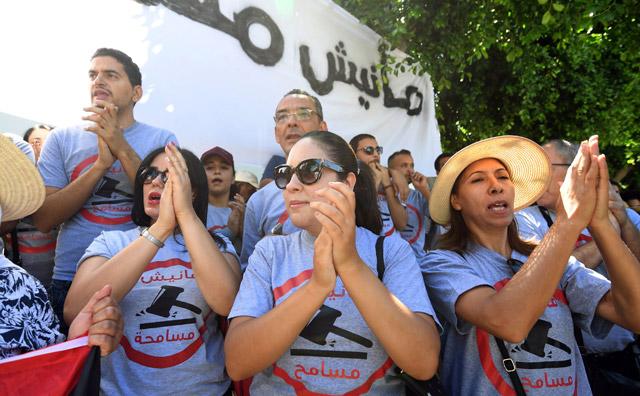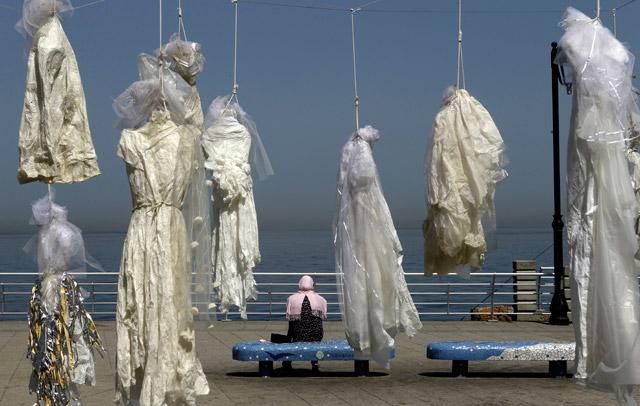You are here
Arab world urged to ditch laws pushing girls to marry their rapists
By Thomson Reuters Foundation - Jul 29,2017 - Last updated at Jul 29,2017

Tunisians chant slogans and wear t-shirts reading in the local Arabic dialect ‘I am not forgiving’, at a demonstration before parliament in the capital Tunis, on Friday (AFP photo)
BEIRUT — Middle Eastern countries should follow Tunisia's example and immediately repeal laws that let rapists off the hook if they marry their victims, human rights groups said on Friday.
Tunisia passed a law on Wednesday to protect women against violence, which included removing an article allowing a rapist to escape punishment if he married his victim.
"Tunisia sends a message to the rest of the region that they should follow suit," said Rothna Begum, Middle East women's rights researcher at Human Rights Watch.
"These provisions... are a relic of the past and the Middle East and North Africa need to... leave it in the past," she told the Thomson Reuters Foundation.
Campaigners have said such laws condemn girls to a lifetime of sexual violence and domestic abuse at the hands of their rapist.
Countries with similar provisions include Jordan, Lebanon, Bahrain, Iraq, Kuwait, Syria and the Palestinian Territories, according to Equality Now, a global legal advocacy organisation.
"This article is a violation of girls' and women's rights... it's crazy we have such laws in our countries while we are in 2017," said Suad Abu-Dayyeh, Equality Now's Middle East consultant.
Jordan's parliament will vote on Sunday on whether to scrap its marriage loophole. Bahrain and Lebanon are also discussing amending or abolishing similar provisions.
Jordanian parliamentarian Wafa Bani Mustafa said parents often agreed to such marriages to minimise "family shame", but she said no girl should be "presented as a gift" to her rapist.
She said it was crucial to end impunity for rapists and to protect their victims who are mostly under 18.
In Lebanon, rights group Abaad is campaigning against the country's law with billboards of women in bloodied and torn wedding gowns. The caption reads: "A white dress doesn't cover up rape."
In April campaigners hung white wedding dresses from nooses on Beirut's popular seafront.
"It's a slap in the face... If you survive a rape then you have to survive it again and again and again," Abaad Programme Manager Roula Masri previously told the Thomson Reuters Foundation.
Some countries in the region have already closed their loopholes. Egypt repealed its law in 1999, and Morocco overhauled its law in 2014 following the suicide of a 16-year-old girl and the attempted suicide of a 15-year-old who were forced to marry their rapists.
Such laws also exist in several countries outside the Middle East including the Philippines and Tajikistan, according to Equality Now.
Related Articles
BEIRUT — Lebanon on Wednesday joined other Arab nations in abolishing a law that lets rapists escape punishment if they marry their victims
BEIRUT — Women in Tunisia may be able to pass their family name on to their children and have equal inheritance with men if proposals, due t
BEIRUT, Lebanon — Iraqi women are ramping up pressure to abolish a law that lets rapists off the hook if they marry their victims, after Tun

















